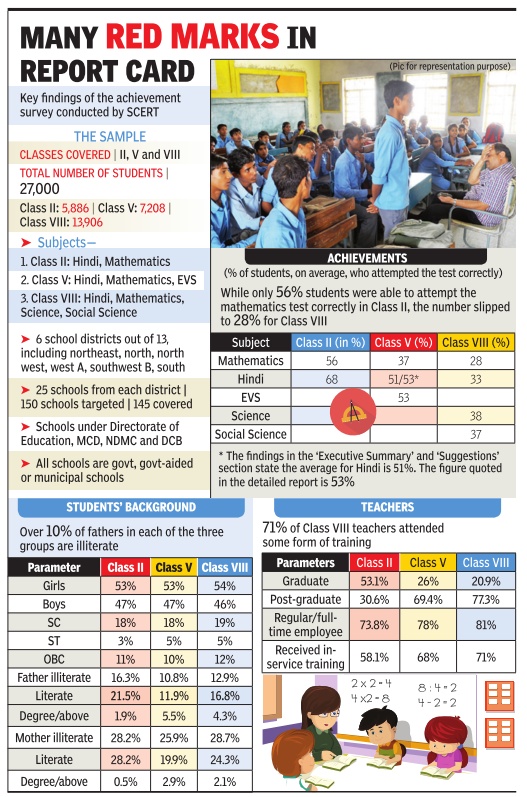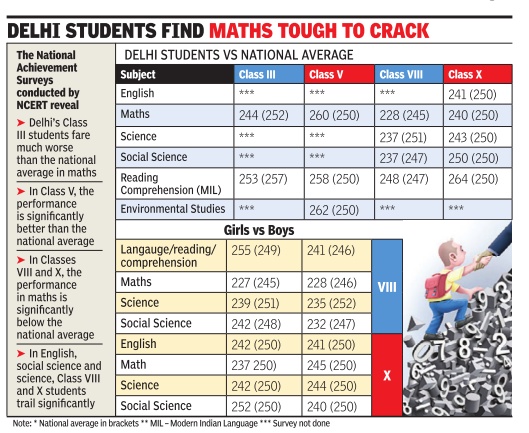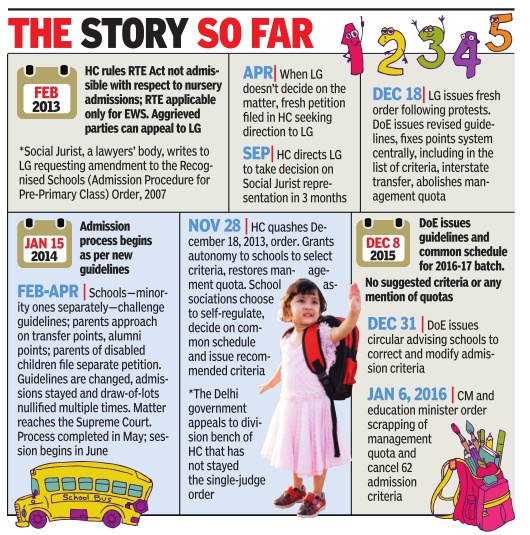School education: Delhi
(→2016: Delhi vs. the national average) |
(→Performance of schools, 2011-16) |
||
| Line 16: | Line 16: | ||
[http://epaperbeta.timesofindia.com/Article.aspx?eid=31808&articlexml=Schools-battle-mass-failure-in-Class-IX-XI-16122016006035 ''The Times of India’’], December 16, 2016 | [http://epaperbeta.timesofindia.com/Article.aspx?eid=31808&articlexml=Schools-battle-mass-failure-in-Class-IX-XI-16122016006035 ''The Times of India’’], December 16, 2016 | ||
| − | [[File: Public school education in Delhi, School enrolment, 2013-16; Dropouts in municipal and state government schools, 2014-16; Enrolment in state government schools, 2013-16.jpg|Public school education in Delhi, School enrolment, 2013-16; Dropouts in municipal and state government schools, 2014-16; Enrolment in state government schools, 2013-16; Graphic courtesy: [http://epaperbeta.timesofindia.com/Article.aspx?eid=31808&articlexml=Schools-battle-mass-failure-in-Class-IX-XI-16122016006035 ''The Times of India’’], December 16, 2016|frame|500px] | + | [[File: Public school education in Delhi, School enrolment, 2013-16; Dropouts in municipal and state government schools, 2014-16; Enrolment in state government schools, 2013-16.jpg|Public school education in Delhi, School enrolment, 2013-16; Dropouts in municipal and state government schools, 2014-16; Enrolment in state government schools, 2013-16; Graphic courtesy: [http://epaperbeta.timesofindia.com/Article.aspx?eid=31808&articlexml=Schools-battle-mass-failure-in-Class-IX-XI-16122016006035 ''The Times of India’’], December 16, 2016|frame|500px]] |
'''Schools battle mass failure in Class IX, XI''' | '''Schools battle mass failure in Class IX, XI''' | ||
Revision as of 06:12, 16 December 2016

This is a collection of articles archived for the excellence of their content. |
Contents |
Schools
Performance of schools, 2011-16
The Times of India’’, December 16, 2016
Schools battle mass failure in Class IX, XI
In its first annual report on public school education in Delhi, the Praja Foundation says what the Delhi government has long acknowledged and has been working on--there's mass failure in Class IX.
The report, released by the NGO, also signals other concerns in all classes--high levels of absenteeism (especially in municipal schools), drop in enrolment figures at primary level despite the Right to Education Act, and the presence of shadow education in the form of private coaching.
According to the report, while all corporation and state government schools have witnessed a high dropout rate in 2014-15 and 2015-16, the east corporation tops the list at 16.3% and 17.7%, respectively. The figure for government schools is 2.9% and 3.1%. The rate of absenteeism is very high in municipal schools. In some districts and subjects, nearly one-fifth of a class was absent at least for a month during a school year.
“The drop in enrolment figures could be due to the linkage with Aadhaar, which has eliminated a lot of duplication. Earlier, children would leave and enrol elsewhere,“ said Saumya Gupta, director, education. Some of the attrition in lower classes, she said, could also be due to efforts to implement the 25% quota for EWS and disadvantaged children.
Explaining the highest dropout rate, Jitender Chaudhary , standing committee chairman of the east corporation, said, “Parents want to send their children to English-medium schools but we don't have many . Many students also come from EWS section and these kids often have to work to stabilise their family's income. We will take steps to fix it.“
The report stated that from 2011 to 2013, government school students performed slightly better than their private school counterparts.“However, in the past three years, they are gradually falling behind.“ The Class X pass percentage in 2015-16 was 95.43% in private schools, while it was 89.25% in the state schools. The report also raised concerns about a significant number of students being held back in classes IX and XI. In government schools, 45.08% of the Class IX students didn't qualify for Class X in 2015-16. For Class XI, the number stood at 34.6%. Gupta said the govern ment's Chunauti programme and a fresh opportunity to kids who have failed Class IX more than twice might “make a huge dent in the dropout rate after Class IX“.
2016: Delhi vs. the national average
The Times of India, Apr 12 2016

Manash Gohain However, Class V Students Do Better Than National Average
The performan ce of Class III students in Delhi is lower than the national average in languages and significantly lower in mathematics. However, the trend is bucked in Class V , where student performance is much higher than the national average. Unfortunately , this achievement is not sustained, with performance in mathematics in Classes VIII and X plunging below the national benchmark. These were revealed by the National Achievement Surveys (NAS) conducted by the National Council of Educational Research and Training (NCERT).
Explaining this dismal graph for mathematics, a teacher in a Delhi government school explained, “Up to Class V , mathematics essentially means counting and a bit of fractions. But students find it hard to cope with integers introduced in Class VI because teachers themselves face problems with the subject.“
At the Class VIII level, the worrisome performance comes in mathematics, science and social sciences, where Delhi's student fell below the national average. Ashok Pandey , principal of Ahlcon International School at Mayur Vihar, attributed this to a “mismatch in the syllabi of the various stages from primary classes to middle school, and from high school to senior secondary“.
“Syllabus development has to progress logically else it causes gaps at various levels,“ said Pandey , and pointed out how while primary classes had no separate science subject besides environmental science, from Class VI onwards, the degree of difficulty for students became sharply high with the separation of the subject into science and social science.
“The teacher's ability to teach shows in the learning ability of the child, especially in Class VI where a lot of new concepts are introduced,“ added Anuradha Joshi, principal of Sardar Patel Vidyalaya.
Nursery admissions: Guidelines
The Times of India, Dec 10 2015

No clarity on rent deeds as proof
The directorate of education's failure in including rent agreements as valid document for residence proof has led to confusion among parents. A large number of parents, whose children will be vying for nursery seats, stay on rent and they have been left wondering whether the documents would be acceptable. “We generally accept rent agreement or a bank account passbook with the address on it as residence proof. We are quite flexible in this regard,“ said Tania Joshi, principal, The Indian School. In the past, the DoE suggested the documents.
“I live in a rented house and have gas connection and rent agreement documents.But will they be accepted as valid address proof ?“ asked a parent on admissionsnursery com. The website owner, Sumit Vohra, said about a quarter of his users live on rent.
“Not all schools accept the rent deed as proof. As per convention, registered rent deeds that are six months old should be added to the list of valid documents,“ he said. Many parents choose to move to ar eas rich in schools so they have more options for admitting their wards.
On the draw of lots, the guidelines say it “shall be conducted in a transparent manner, preferably in presence of parents.“ Vohra points out that in past years presence of parents or videography was mandatory . Making this optional gives schools permission to not allow parents during the draw. The debate on upper age limit has been on for years. There will be confusion on this too as some schools include age in their criteria and allot points to it.
The guidelines are for general category and private unaided schools. Though the circular doesn't specify this, the DoE has clarified that it will be applicable to minority institutions as well.
The decision on economically weaker sections and disadvantaged groups has been welcomed by schools, though lawyer-activist Khagesh Jha maintains it is discriminatory .“Let the government handle it. Especially after last year, I don't want any problems,“ Joshi said. Delhi Police had cracked down on fake EWS admissions last year and even arrested a school principal.

February 2016
HC restores management quota
The Times of India, Feb 05 2016
Management quota back as HC stays AAP govt's decision The Delhi high court stay ed the AAP government's decision to scrap management quota in nursery admissions on Thursday , calling it a balancing act “whereby discretion of private unaided schools was minimised, but not altogether abolished“. The court said the government's circular staying the quota was “without any authority“ and in conflict with a 2007 order by the LG. The high court's interim order, unless superseded by a larger bench or Supreme Court, is likely to govern nursery admissions this year, reports Abhinav Garg.
In a partial relief, the court endorsed the city government's elimination of 51 of 62 admission criteria, saying “there's nothing in the (remaining) 11 criteria which would show that they are unreasonable...(andor) can lead to maladministration“.
HC stays nursery order to scrap management quota
The Times of India, Feb 05 2016

Abhinav Garg
Says crucial to maintain school autonomy, but okays govt decision to cancel 51 of 62 criteria
The Delhi high court stayed the AAP government's decision to scrap the management quota in nursery admissions. Justice Manmohan said the Delhi government's circular was “without any authority“ and in conflict with a 2007 order issued by the LG. “A balancing act was done by the Ganguly Committee and the government whereby discretion of private unaided schools was minimised, but not altogether abolished,“ Justice Manmohan said, adding that the quota had been recommended by the Ganguly panel and approved by the government in 2007.
There was some consolation for the government as the court endorsed the striking down of 51 of the 62 admission criteria; but 11were retained as the schools pleaded these were necessary to maintain autonomy and discretion. These include proven track record of parents, extra marks for skills in music or sports, empirical achievements and the gender of a child.
The court accepted these on the ground that “there is nothing in the 11criteria which would show that they are unre asonable or based on whims and fancies and or they can lead to maladministration“.
The court pointed out that the 2007 order permitted management quota up to 20% and it cannot be overturned. It said “promoters of a school who make investment at their own personal risk are entitled to full autonomy in administration, including the right to admit students“ as long as they don't misuse it. The court also highlighted the failure of the AAP government to get approval from the LG before issuing the circular.It reminded the government that under the rules, only the LG has the authority to issue guidelines.
The interim order came on the pleas filed by Action Committee Unaided Recognised Private Schools and Forum for Promotion of Quality Education for All, challenging the abolition of the management quota and other criteria by the government.
Differing with the state government, the court said, “Taking into account the parentage of the child may be relevant in certain circumstances, for instance, if the father of the child was a recipient of a gallantry award or a sports award or had given valuable advice and service to the school like a doctor, then giving preferen ce to such a ward in admission would not constitute maladministration. In all probability , such parents would contribute to the growth and evolution of the school as well as its students.“
The court also said that even the EWS category is based on the parentage of a child.
The court recalled the fate of an earlier attempt in 2013 to abolish the management quota and pointed out that the LG's order was quashed by court.
Can't fix upper age limit: HC
The Times of India, Feb 06 2016
Abhinav Garg
Directs DoE To Accept Nursery Applications Till February 9, 2016
Governments can't spring surprises on parents or children in education, which is a Fundamental Right, the Delhi high court said, staying another nursery admission circular of Delhi government. A day after staying the government's decision to scrap the management quota, Justice Manmohan allowed children above the age of four to apply for admissions in pre-school or nursery classes in private schools. The court has told DoE to ensure schools accept application till 4pm of February 9.
The court, however, stopped short of commenting on the absence of LG's sanction for the age criteria after the government submitted that it had not addressed the court on this point. HC then asked the director of education to ensure that EWS applications are also accepted online, and posted the case for further hearing where it will take up other legal issues connected to the circular.
The bench said there was no upper age limit before December 18, 2014, for years and the cap had surprised many parents, who would have planned for the admission of their children if they had known it earlier.
The court also acknowledged that it becomes diffi cult for children to get admission in higher classes if they have not studied in the same school earlier since institutions prefer to promote their own students.
HC's order came on a number of petitions filed by minors or their parents, challenging the Delhi government's notification fixing the maximum age for nursery in private unaided schools at four years. Advocates Ashok Aggarwal and Rishi Manchanda appeared for some of the petitioners.
